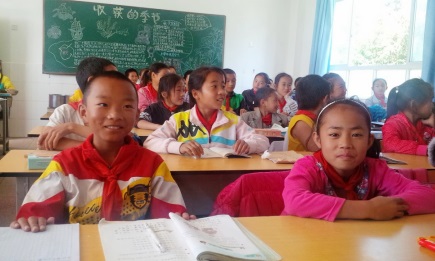Growing in skills and happiness

In a new reflection on the recent publication of OECD on the value of building social and emotional skills among young people he analyses thier essential rol in education and the development of personality ánd knowledge.
“As we know from personal experiences, when we feel a deep sense of well-being we are far better able to absorb new information, take risks and be more responsible for our lives. So don’t we want that for all our kids?
But growing up is often quite a challenging period. Ensuring that kids have a wide variety of skills to help them cope with some of life’s challenges may not always occur naturally. Sometimes they will need help in building social and emotional skills – which are the kind of skills involved in achieving goals, working with others and managing emotions. These skills play an indispensable role in all stages of life. Essentially, along with cognitive and learning abilities, it is equally important that our youth develop social and emotional skills in order to balance and ground their personalities and strengthen their characters.
Some examples are: Perseverance, the ability to keep going when things get tough and rough (like when the sports teacher demands that you to run another 10 laps of the pitch and you’re already exhausted). Caring, the capacity to be kind to others and to be able to show and feel empathy (like supporting an upset friend by listening and comforting them irrespective of other priorities or personal time constraints). Self-esteem is being able to feel good and being proud of their personal achievements and comfortable with their physical appearances (regardless of any unpleasant comments from peers).
A new book launched today by the OECD, entitled Skills for Social Progress: The Power of Social and Emotional Skills, addresses the importance of these types of skills to enhance and balance our lives. This report confirms international research studies, which validate the need for a steady set of cognitive, social and emotional skill in order to succeed well in life. Fortunately, some of these skills are flexible and adjustable during the growing up years, allowing policy makers, teacher and parents the opportunities to provide the right kind of learning environments to support and nurture them. In the past, we often thought that these types of skills couldn’t be successfully quantified, but fortunately this report demonstrates that they can be measured meaningfully, within cultural and linguistic boundaries.
Additionally, the OECD is going to develop more measures and an international comparative framework, in order to better grasp youth’s current and future needs for social and emotional skills. So this report augments the reflection on how future policies could best encourage and nurture the development of social and emotional skills, of course, working hand in hand with parents and teachers.
Not surprisingly, we need a wide range of diverse skills to contribute to the economy, support better social outcomes and build more unified and tolerant societies. Cognitive abilities such as literacy and problem-solving remain crucial. But, people with strong social and emotional foundation skills thrive better in a highly dynamic labour market and rapidly changing world. Investing in these skills will be central to addressing numerous socio-economic challenges, and for ensuring prosperous, healthy, engaged, responsible and happy citizens.”
Meest Gelezen
Wederom intimidatie van journalisten door universiteit, nu in Delft
‘Burgerschapsonderwijs moet ook verplicht worden in hbo en wo’
Extra geld voor bètafaculteiten is daar nooit terechtgekomen
Raad van State: laat taaltoets nog niet gelden voor hbo-opleidingen
Vrouwen houden universiteit draaiende, maar krijgen daarvoor geen waardering

